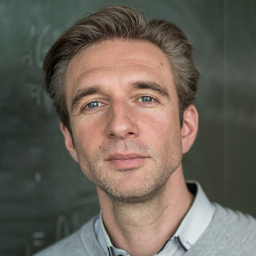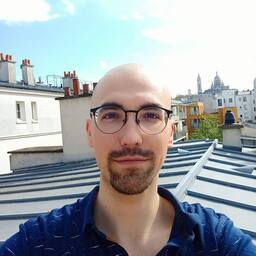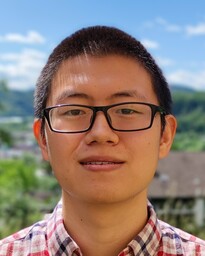Entanglement Detection Via Frank-Wolfe Algorithms completed
This project applies a Frank-Wolfe-based approach for separability certification and entanglement detection of multipartite quantum states. The method is further exploited to derive entanglement witnesses for cases of incomplete state characterisation, often encountered in experiments.
🧑🎓 Project Members
🪙 Funding
This project was being funded by the Berlin Mathematics Research Center MATH+ (project ID AA2-19), itself funded by the German Research Foundation (DFG) under Germany's Excellence Strategy (EXC-2046/1, project ID 390685689) from January 2024 to December 2025.

🔬 Project Description
Entanglement, a fundamental concept in quantum mechanics, lies at the heart of many quantum technologies and has captured the attention of scientists and researchers worldwide. The phenomenon of entanglement occurs when two or more quantum particles become intrinsically correlated, such that the state of one particle cannot be described independently of the others. This peculiar feature, famously referred to as ``spooky action at a distance’’ by Einstein, has perplexed and fascinated physicists since its discovery. Over the years, entanglement has emerged as a powerful resource for numerous applications, including quantum communication, quantum computing, and quantum sensing.
Detecting entanglement is a crucial step in harnessing its potential for quantum technologies. Several standard methods have been developed to ascertain the presence of entanglement in quantum systems. One such approach is the measurement of entanglement witnesses, which are observables that can discern entangled states from separable (or disentangled) ones. Mathematically, they consist of hyperplanes separating a specific state (in practice, dictated by the experimental setup) from the convex set of separable states.
Conditional gradient methods have seen success in quantum entanglement by producing certificates that a state is separable. The original Frank-Wolfe algorithm was rediscovered and suscitated a lot of interest, but the current applications in this domain suffer the same limitations as this original algorithm, upon which a lot of theoretical and applied progress has been made in the last decade. We thus expect significant improvements over existing methods, leading both to novel theoretical results in entanglement theory and immediate usage by experimental groups.
Currently, we utilize the the blended pairwise conditional gradient algorithm to achieve more accurate and robust separable bounds for the bound entanglement, which is very close to separable space and so hard to detect.
📝 Publications and preprints
Preprints
- Li, J., Liu, Y.-C., Chen, X.-X., Meng, Z., Fan, X.-Y., Wang, W.-H., Ma, J., Zhang, A.-N., and Shang, J. (2025). Real-time Preparation and Verification of Nonstabilizer States.
[arXiv]
[BibTeX]
@misc{2025_JianEtAl_Qsvnonstabilizer_2507-11180, archiveprefix = {arXiv}, eprint = {2507.11180}, arxiv = {arXiv:2507.11180}, primaryclass = {quant-ph}, year = {2025}, author = {Li, Jian and Liu, Ye-Chao and Chen, Xiao-Xiao and Meng, Zhe and Fan, Xing-Yan and Wang, Wen-Hao and Ma, Jie and Zhang, An-Ning and Shang, Jiangwei}, title = {Real-time Preparation and Verification of Nonstabilizer States}, date = {2025-07-15} } - Liu, Y.-C., Halbey, J., Pokutta, S., and Designolle, S. (2025). A Unified Toolbox for Multipartite Entanglement Certification.
[arXiv]
[BibTeX]
@misc{2025_LiuHalbeyPokuttaDesignolle_Unifiedtoolboxmultipartite_2507-17435, archiveprefix = {arXiv}, eprint = {2507.17435}, arxiv = {arXiv:2507.17435}, primaryclass = {quant-ph}, year = {2025}, author = {Liu, Ye-Chao and Halbey, Jannis and Pokutta, Sebastian and Designolle, Sébastien}, title = {A Unified Toolbox for Multipartite Entanglement Certification}, date = {2025-07-23} } - Porto, L. E. A., Designolle, S., Pokutta, S., and Quintino, M. T. (2025). Measurement Incompatibility and Quantum Steering Via Linear Programming.
[arXiv]
[BibTeX]
@misc{2025_PortoDesignollePokuttaTulio_LPforJM_2506-03045, archiveprefix = {arXiv}, eprint = {2506.03045}, arxiv = {arXiv:2506.03045}, primaryclass = {quant-ph}, year = {2025}, author = {Porto, Lucas E. A. and Designolle, Sébastien and Pokutta, Sebastian and Quintino, Marco Túlio}, title = {Measurement Incompatibility and Quantum Steering Via Linear Programming}, date = {2025-06-03} }
Full articles
- Designolle, S., Vértesi, T., and Pokutta, S. (2026). Better Bounds on Grothendieck Constants of Finite Orders with Applications to Bell Nonlocality. Physical Review A, 113, 022401.
DOI: 10.1103/m5mn-c5dx
[arXiv]
[BibTeX]
@article{2023_DesignolleVertesiPokutta_Grothendieckconstants, year = {2026}, journal = {Physical Review A}, date = {2026-02-02}, volume = {113}, pages = {022401}, doi = {10.1103/m5mn-c5dx}, archiveprefix = {arXiv}, eprint = {2409.03739}, arxiv = {arXiv:2409.03739}, primaryclass = {math.OC}, author = {Designolle, Sébastien and Vértesi, Tamás and Pokutta, Sebastian}, title = {Better Bounds on Grothendieck Constants of Finite Orders with Applications to Bell Nonlocality} } - Liu, Y.-C., and Shang, J. (2025). Beating the Optimal Verification of Entangled States Via Collective Strategies. Physical Review. A/Physical Review, A, 112(6).
DOI: 10.1103/6yrh-9tzp
[arXiv]
[BibTeX]
@article{2024_LiuShang_Collectiveverification, year = {2025}, journal = {Physical review. A/Physical review, A}, volume = {112}, number = {6}, doi = {10.1103/6yrh-9tzp}, archiveprefix = {arXiv}, eprint = {2410.00554}, arxiv = {arXiv:2410.00554}, primaryclass = {quant-ph}, author = {Liu, Ye-Chao and Shang, Jiangwei}, title = {Beating the Optimal Verification of Entangled States Via Collective Strategies} }



